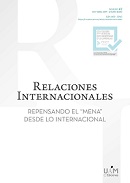Articles
What do we talk about when we talk about the “Middle East”?: the contribution of the agonistic perspective for deconstructing orientalist narratives
Published
September 30, 2019
Keywords:
Orientalism, agonistic theory, discourse analysis, identity
How to Cite
PRADO, C. (2019). What do we talk about when we talk about the “Middle East”?: the contribution of the agonistic perspective for deconstructing orientalist narratives. Relaciones Internacionales, (42), 37–54. https://doi.org/10.15366/relacionesinternacionales2019.42.003
Abstract
Forty years after its first publication (1978), Edward Said’s Orientalism is still regarded as a seminal work, especially concerning subjects such as the construction and representation of the “Other” and their impact on the way we imagine, discuss and represent the space usually labelled as “the Middle East”. This label is, according to the author, a byproduct of western colonization, deeply charged with political, social and economic connotations. For the last twenty years, the dominant discourse about the Middle East has been constructed by a series of interwoven narratives punctuated by religious fanaticism and cultural relativism (the latter is particularly relevant concerning Human Rights issues). Within this specific discourse, concepts such as “the clash of civilizations”1 or the alleged struggle to keep up with Western progress2 became prominent buzzwords. In this article we will discuss such narratives from an agonistic perspective. Based on its contribution to the analysis of the nexus between power structures and discourse, we will attempt to apply an agonistic lens to discourses on and about the Middle East, specifically from 9/11 onwards and in the aftermath of the so called “War on Terror”.Downloads
Download data is not yet available.





